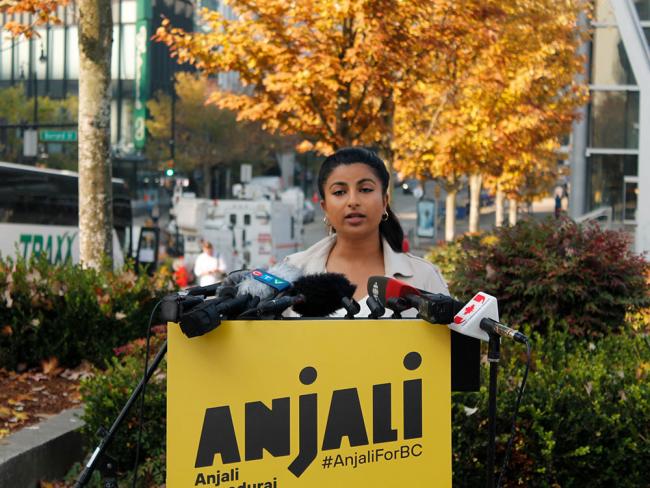Articles Menu

Oct. 20, 2022
What a very bad day for the BC NDP. Its leadership campaign has descended into chaos and controversy.
David Eby will become party leader and premier even though he’s likely supported by a minority of current members. And the competence of the party’s old guard appears highly questionable.
The NDP’s executive council voted to kick Anjali Appadurai out of the leadership race Wednesday night, accepting the recommendation of party chief electoral officer Elizabeth Cull, a ’90s-era BC NDP cabinet minister.
Even though the newcomer probably had enough member support to become leader and premier.
People were joining the NDP “fraudulently,” she found. “The BC NDP requires members to affirm not only that they are not members of other parties, but also that they are not supporters of other parties.”
That’s a recent development. Until 2020 the BC NDP membership application simply required prospective members to declare, “I intend to join the BC NDP, and that I am not a member of another political party.”*
And even that wasn’t enforced in the past, at least according to former BC NDP cabinet minister and current lobbyist Moe Sihota. In 2000, he told CBC that about 3,000 BC Liberal members had also taken out BC NDP memberships in order to play a role in the leadership race that saw Ujjal Dosanjh briefly become the premier.
Cull’s second reason for booting Appadurai from the contest is stronger.
Her report alleges the campaign violated Election Act spending limits, a breach severe enough, Cull argued, to justify disqualifying Appadurai.
Appadurai’s campaign was supported by Dogwood, which describes itself as B.C.’s “largest nonpartisan citizen action network” and claims 281,000 supporters and 859 volunteers. The non-profit organization, with an environmental focus, went all in to boost her campaign.
Perhaps too all in.
Under the Election Act, it’s fine for any individual or organization to encourage people to vote. But activities encouraging support for a specific candidate are subject to spending limits, and the value of these activities must be reported.
Dogwood says it consulted Elections BC and stayed within the rules. Most observers, looking at Dogwood’s campaign, would likely disagree.
Chek’s Rob Shaw noted Dogwood emailed supporters urging them to join the BC NDP and vote for Appadurai. “This is a genuine opportunity to put a climate champion directly into the premier’s office,” read one email. “Climate justice advocate Anjali Appadurai could be the boldest premier in generations,” read another.
Cull found that this email campaign supporting Appadurai’s candidacy had been co-ordinated by Dogwood in tandem with Appadurai’s leadership campaign. There are close connections between the two, she noted. Dogwood’s communications director Kai Nagata was an advisor to the Appadurai campaign, as was Dogwood campaigns manager Alexandra Woodsworth.
The contribution wasn’t reported and would have exceeded campaign spending limits, she found.
That might call for fines under the Election Act, but not disqualification.
Cull came to a different conclusion.
“The improper co-ordination with third parties (primarily Dogwood) played such a significant role in the Appadurai Campaign that it is impossible to create a level playing field at this point, and thus impossible to restore the Leadership Election Campaign to a state of integrity in which I could have confidence,” she wrote.
But her findings don’t demonstrate that Dogwood played such a significant role. The report doesn’t include the numbers of new members signed up during the campaign, or how many Cull has concluded are not legitimate.
Which prompts a question: Would Appadurai likely be the next party leader and premier even if the disputed members were disqualified from voting?
The BC NDP set the stage for this mess. John Horgan was crowned leader in 2014 without any other candidates contesting the race. Eby, billing himself as a status quo candidate, was on track for the same coronation until Appadurai entered the race.
Until she did, it had looked like a second complacent transfer of power would take place within the party establishment. Certainly that’s how the Eby team acted, failing to present policies that would build support or sign up new members.
The largely unspoken argument is that Eby has a better chance of winning an election against Kevin Falcon and the BC Liberals in the next election in 2024. Better to be in power with a modest agenda than on the opposition benches with bold ideas.
“The worst day in government is still better than the best day in opposition,” as former BC Liberal cabinet minister Rich Coleman put it.
But the BC NDP has managed to make what could have been an energizing leadership transfer into a debacle. Supporters — new and old — should wonder how the party could get it so wrong.
* Story updated on Oct. 20 at 1:30 p.m. to include current BC NDP membership requirements.
[Top photo: Anjali Appadurai challenged the NDP’s decision to bar her from the leadership race Wednesday. Photo for The Tyee by Zak Vescera.]